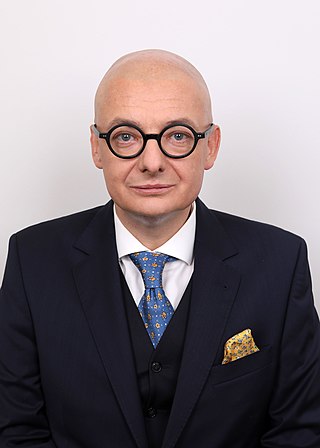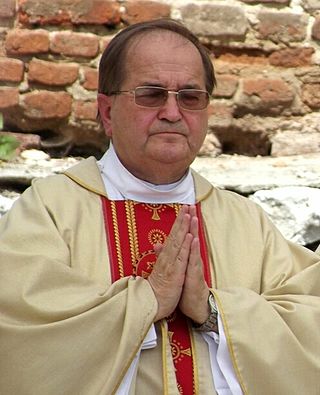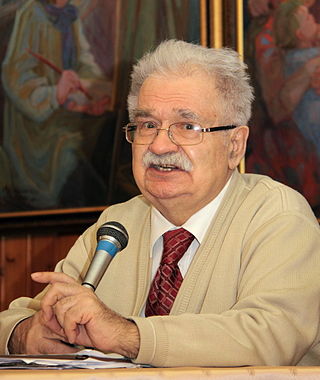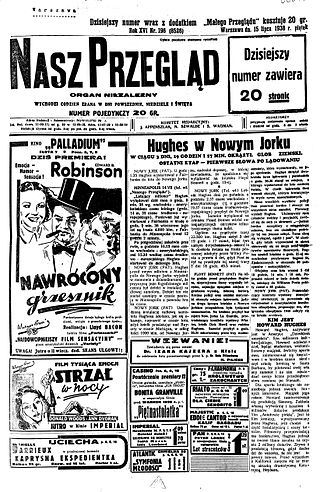
The Jedwabne pogrom was a massacre of Polish Jews in the town of Jedwabne, German-occupied Poland, on 10 July 1941, during World War II and the early stages of the Holocaust. Estimates of the number of victims vary from 300 to 1,600, including women, children, and elderly, many of whom were locked in a barn and burned alive.
National Democracy was a Polish political movement active from the second half of the 19th century under the foreign partitions of the country until the end of the Second Polish Republic. It ceased to exist after the German–Soviet invasion of Poland of 1939. In its long history, National Democracy went through several stages of development. Created with the intention of promoting the fight for Poland's sovereignty against the repressive imperial regimes, the movement acquired its right-wing nationalist character following the return to independence. A founder and principal ideologue was Roman Dmowski. Other ideological fathers of the movement included Zygmunt Balicki and Jan Ludwik Popławski.

The League of Polish Families is a social conservative political party in Poland, with many far-right elements in the past. The party's original ideology was that of the National Democracy movement which was headed by Roman Dmowski, however in 2006 its leader Roman Giertych distanced himself from that heritage.
Marek Jan Chodakiewicz is a Polish-American historian specializing in Central European history of the 19th and 20th centuries. He teaches at the Patrick Henry College and at the Institute of World Politics. He has been described as conservative and nationalistic, and his attitude towards minorities has been widely criticized.

Michał Tomasz Kamiński is a Polish politician and a member of the Senate with the Union of European Democrats. He was chairman of the European Conservatives and Reformists in the European Parliament from July 2009 until March 2011.
After the fall of Communism in Poland in 1989, Jewish cultural, social, and religious life has experienced a revival. Many historical issues related to the Holocaust and the period of Soviet domination (1945–1989) in the country – suppressed by Communist censorship – have been reevaluated and publicly discussed leading to better understanding and visible improvement in Polish–Jewish relations. In 1990, there were 3,800 Jews in Poland, 0.01% of Poland’s population, compared to 3,250,000 before 1939. The number had dropped to 3,200 in 2010.

Radio Maryja is a religious and political socially conservative Polish radio station. It was founded in Toruń, Poland, on 9 December 1991, by the Redemptorist Tadeusz Rydzyk. The name "Maryja" is a traditional Polish form of the name "Mary", referring to the Virgin Mary.
Żydokomuna is an anti-communist and antisemitic canard, or a pejorative stereotype, suggesting that most Jews collaborated with the Soviet Union in importing communism into Poland, or that there was an exclusively Jewish conspiracy to do so. A Polish language term for "Jewish Bolshevism", or more literally "Jewish communism", Żydokomuna is related to the "Jewish world conspiracy" myth.

Tadeusz Rydzyk is a Roman Catholic priest and Redemptorist, founder and director of the conservative Radio Maryja station, and founder of the University of Social and Media Culture in Toruń.

Iwo Cyprian Pogonowski was a Polish-born polymath and inventor with 50 patents to his credit. He was a civil and industrial engineer by profession, educated in Poland, Belgium, and the United States. He was also a writer on Polish and European history, author of historical atlases, and a lexicographer.

Stanisław Andrzej Michalkiewicz is a Polish far-right political commentator, lawyer, former politician, opposition activist in the communist Polish People's Republic, and book author. Michalkiewicz is known for making antisemitic comments involving the Holocaust.

Ryszard Janusz Bender was a Polish right-wing politician and historian. He is noted for his characterization of Auschwitz as a "labour camp", attracting allegations of Holocaust denial.

Piotr Gontarczyk is a Polish historian with a doctorate in history and political science.

Jerzy Robert Nowak is a Polish historian, and former columnist in right-wing Catholic media outlets including Nasz Dziennik, Telewizja Trwam, Radio Maryja.

TV Trwam is a Polish TV channel in Toruń, Poland, belonging to the Lux Veritatis Foundation.
Bogumił Andrzej Grott is a Polish historian, lecturer and professor at the Institute of Religious Studies of Jagiellonian University in Kraków. He specializes in the history of Polish political thought, especially nationalism and its connection with Catholicism, right-wing National Democracy political camp, and Polish-Ukrainian relations.

Nasz Przegląd was a Polish-Jewish newspaper with Zionist leanings. The newspaper was published between March 25, 1923 and September 20, 1939. Nasz Przegląd was the most well-known Polish-Jewish newspaper in interwar Poland. It was noted for its quality of writing and staunch Polish-Jewish stance. It was issued daily from Warsaw. The editorial team of Nasz Przegląd consisted of personalities that had been working with previous Polish-Jewish press outlets, Opinia Żydowska, Głos Żydowski and Dziennik Poranny.

The Lux Veritatis Foundation is a Polish religious organization founded in Warsaw in 1996 by two Redemptorists: Fr. Tadeusz Rydzyk and Fr. Jan Król. It is the owner of the Trwam TV. In 2006, it got the concession to explore thermal water in Toruń.

The program of the Polish Law and Justice (PiS) party has chapters on "identity" (tożsamość) and "history policy". The implementation of the PiS history policy consists in promoting, in Poland and internationally, a version of history based on a policy of memory that focuses on protecting the "good name" of the Polish nation.
This is a select bibliography of English language books and journal articles about the history of Poland during World War II. A brief selection of English translations of primary sources is included. Book entries have references to journal articles and reviews about them when helpful. Additional bibliographies can be found in many of the book-length works listed below; see Further Reading for several book and chapter-length bibliographies. The External Links section contains entries for publicly available select bibliographies from universities. This bibliography specifically excludes non-history related works and self-published books.













